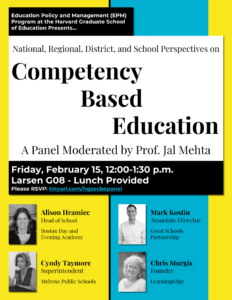 What fun it was to gather together at Harvard University Graduate School of Education for a conversation on competency-based education. It was also truly humbling to once again be reminded of how difficult it is to convey the core concepts of competency education without falling down a rabbit hole of misconceptions rooted in the beliefs that drive the traditional system. Personalized learning is the one that caused the most problems with its multiple uses: differentiated instruction, tailoring to interests, and empowering students with the cognitive and social/emotional skills to manage their learning.
What fun it was to gather together at Harvard University Graduate School of Education for a conversation on competency-based education. It was also truly humbling to once again be reminded of how difficult it is to convey the core concepts of competency education without falling down a rabbit hole of misconceptions rooted in the beliefs that drive the traditional system. Personalized learning is the one that caused the most problems with its multiple uses: differentiated instruction, tailoring to interests, and empowering students with the cognitive and social/emotional skills to manage their learning.
Thanks to Casey Fuess, now a student at HU-GSE, who organized a panel with myself; Alison Hramiec, Principal of Boston Day and Evening Academy; Cyndy Taymore, Superintendent of Melrose School District; and Mark Kostin, Assistant Director, Great Schools Partnership. Jal Mehta, one of the few professors at Harvard thinking deeply about what it means to modernize our education system, along with Chris Dede and Todd Rose, was our skilled facilitator.
We did our best to break the traditional panel style, as it isn’t consistent with what we know about how people learn. Mehta was a thoughtful guide, helping us to balance the multiple interests: delivering the basics, responding to where people were in their learning and questions, and offering ideas that might be provocative, push toward deeper understanding, or offer new insights. We started with stories from Hramiec and Taymore, as they are the most grounded in the day-to-day of transitioning to and leading competency-based schools. From there, we drew out ideas about a definition of competency-based education, followed by sharing resources from Great Schools Partnership and CompetencyWorks. Finally, the participants talked among themselves to develop a set of questions that then guided the panelists toward topics that were of the most interest. I think, with a bit of finessing, this could become a strong alternative to the traditional conference panel. However, it helped to have ninety minutes rather than the standard one-hour session.
We spent some time clarifying that there are at least four types of competencies: academic knowledge and skills (usually captured within state standards); transferable skills needed to apply learning (higher order skills or 21st century skills); the technical or marketable skills developed in career tech higher education programming; and the cognitive and social/emotional skills needed to manage one’s learning.
There was indeed lots of interest around social/emotional learning, such as:
- What are the implications of SEL for on-the-job professional learning?
- How are schools assessing SEL?
- How are schools addressing positive racial and ethnic identity development?
One question, wondering how teachers promote SEL in the context of individualization, highlighted the misconception people have regarding competency education and personalization.
There were also questions about the role of the principal; the degree that learning progressions needed to be linear; the relationship between CBE and deeper learning for marginalized students; and the viability of introducing schools through different “grain size” (i.e., classroom, school, district).
We didn’t get to dive into the more policy-related issues such as why Maine stepped back on its proficiency-based diploma (which requires an investigation and deep reflection, as it is truly illuminating into the work we all do) and how states are creating new opportunities within ESSA.
One of my favorite questions was, “What are we going to do if we reduce or eliminate letter grades and the traditional GPA? How are we going to ensure students excel and are recognized for excellence?” My two cents is to focus on bands of excellence, not sorting students based on .001 of their GPA, and creating multiple bands of excellence such as greatest growth and most valuable teammates within a community of learners.















